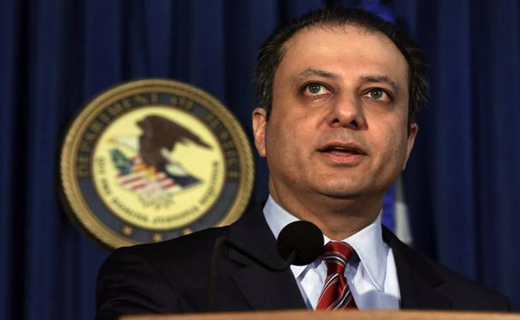
NEW YORK – After 26 years, the federal government plans to end its consent decree and its direct oversight governing the Teamsters. But there are still strings attached.
Nevertheless, their agreement, to be officially discussed at a Feb. 11 hearing in Manhattan before Loretta Preska, chief judge of the U.S. District Court for Southern New York, marks an historic step for the union. Objectors, if any, could also speak at the session.
The pact also achieves a goal Teamsters President Jim Hoffa stated when he took office in 1999. The government had imposed the consent decree to end mob influence in the union. Hoffa argues the decree works and should be lifted, with control returned to the union.
The George H.W. Bush administration imposed the consent decree in 1989, it said, to ensure honest elections and to root out La Cosa Nostra influence in the Teamsters. Then-U.S. Attorney Rudolph Giuliani, a Republican, used the prosecution of the union to propel himself upwards politically.
“Now is the time to return the union’s management and control to the elected leadership of the IBT and the rank-and-file members,” the union’s executive board declared in its resolution accepting the agreement hammered out between Teamsters General Counsel Brad Raymond and the U.S. attorney’s office.
In the court papers filed with Preska, the U.S. attorney and the union jointly agree “there has been significant success in eliminating corruption from within the IBT and in conducting free, open and democratic elections for its international officers and convention delegates.”
Those democratic one-unionist one-vote elections – and safeguards – will continue permanently, the new agreement says and the Teamsters board agrees.
But the union and the U.S. attorney also agree “the threat posed to the IBT by organized crime and other corrupting influences, while substantially diminished, persists.” So there will be a five-year transition period, to also cover the Teamsters’ next elections in 2016 and 2021, and supervisory anti-corruption structures – or variations of them – will remain in place.
And in its resolution, the Teamsters board pledges the union will “ensure the terms of the agreement are adhered to, that the members’ right to vote for international union officers shall remain inviolate, and that corrupt elements will never have a place in the IBT.”
The new agreement also incorporates a list of former union officials associated with organized crime, bans them from ever having any union role, and bans other Teamsters from contacting or working with them in any way, just as rulings under the consent decree did.
“By entering into this final agreement and order” the government and the Teamsters “re-commit themselves to the original objectives of the consent decree, which remain the objectives of this final order,” their 27-page pact says.
“In addition to those objectives, the objectives of this final order are to reduce and ultimately eliminate the government’s role in the affairs of the IBT, except as otherwise expressly provided in this order, while, at the same time, preserving the gains achieved by the consent decree.”
Other objectives are “continuing to foster and promote democracy in the IBT through independent supervision of IBT elections, continuing the fight against criminal elements, organized crime, and corruption that threaten the IBT today, and preventing the re-emergence of those elements of organized crime and corruption that have been eliminated from the IBT.”
And if the government believes the union is backsliding, either in open elections or in allowing returned influence of organized crime, the U.S. Attorney for Southern New York can notify the union of its concerns and then return to court to prove its case by a “preponderance of the evidence” – the lowest standard – the proposed final order warns.
The union board’s resolution also agrees to the details of continued anti-corruption oversight which the final order spells out. In the first year of the transition, the independent review board and its structure stays. The IRB is a group of anti-corruption investigators and imposers of discipline the consent decree established. For the following four years, “the IRB will be replaced by two independent disciplinary officers, an independent investigations officer and an independent review officer,” the Teamsters board affirms.
“The independent investigations officer will investigate allegations of wrongdoing throughout our union. The independent review officer will monitor the IBT’s actions in disciplinary cases,” the Teamsters board adds. That review officer must be a former federal or state judge, experienced in labor law and federal union discipline requirements or both.
And if the independent review officer finds any Teamsters body is imposing inadequate discipline on an alleged malefactor, the IRO can demand a justification within 20 days, hold a new hearing, admit more evidence and issue a final ruling in the case, with no appeals.
Photo: Preet Bharara, the U.S. attorney for the Southern District of New York, joined with the Teamsters in asking a federal judge to terminate the consent order that had been in place since March 1989. | Richard Drew/AP












Comments